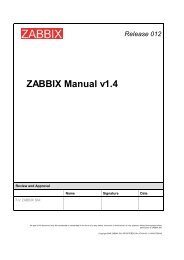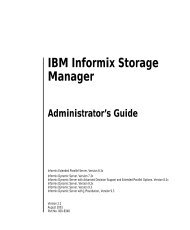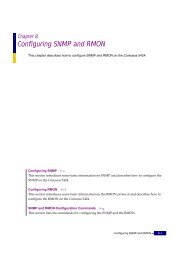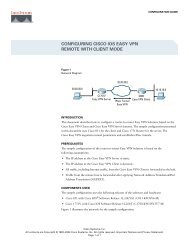Solaris Application Programming, 1/e - Chapter 4 - Parent Directory
Solaris Application Programming, 1/e - Chapter 4 - Parent Directory
Solaris Application Programming, 1/e - Chapter 4 - Parent Directory
You also want an ePaper? Increase the reach of your titles
YUMPU automatically turns print PDFs into web optimized ePapers that Google loves.
4.3 TOOLS THAT REPORT CURRENT SYSTEM STATUS 67<br />
per second (swrit/s), number of forks per second (fork/s), number of execs<br />
per second (exec/s), number of characters transferred by read (rchar/s),<br />
and number of characters transferred by write (wchar/s).<br />
Next is a report of file access system routines called per second. The number<br />
of files located by inode entry (iget/s), number of file system pathname<br />
searchs (namei/s), and number of directory block reads (dirbk/s) are<br />
included.<br />
TTY I/O reports stats on character I/O to the controlling terminal. This<br />
includes raw character rate (rawch/s), processed character rate (canch/s),<br />
output character rate (outch/s), receive rate (rcvin/s), transmit rate<br />
(xmtin/s), and modem interrupts per second (mdmin/s).<br />
Process, inode, file, and lock table sizes are reported as proc-sz, inod-sz,<br />
file-sz, and lock_sz. The associated overflow (ov) fields report the overflows<br />
that occur between samples for each table.<br />
The number of messages and semaphores per second is reported as msg/s<br />
and sema/s.<br />
Paging to memory is reported as the number of page faults per second that<br />
were satisfied by reclaiming a page from memory (atch/s), the number of<br />
page-in requests per second (pgin/s), the number of page-ins per second<br />
(ppgin/s), the number of copy on write page faults per second (pflt/s),<br />
the number of page not in memory faults per second (vflt/s), and the<br />
number of faults per second caused by software locks requiring physical I/O<br />
(slock/s).<br />
Paging to disk is reported as the number of requested page-outs per second<br />
(pgout/s), the number of page-outs per second (ppgout/s), the number of<br />
pages placed on the free list per second (pgfree/s), the number of pages<br />
scanned per second (pgscan/s), and the percentage of igets that required a<br />
page flush (%ufs_ipf).<br />
Free memory is reported as the average number of pages available to user<br />
processes (freemem), and the number of disk blocks available for swapping<br />
(freeswap).<br />
Kernel memory allocation is reported as a small memory pool of free memory<br />
(sml_mem), the number of bytes allocated from the small memory pool<br />
(alloc), and the number of requests for small memory that failed (fail).<br />
Similar counters exist for the large pool (lg_mem, alloc, fail). The amount<br />
of memory allocated for oversize requests is reported as ovsz_alloc, and the<br />
number of times this failed as fail.
















